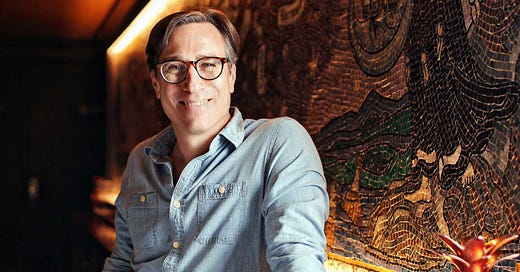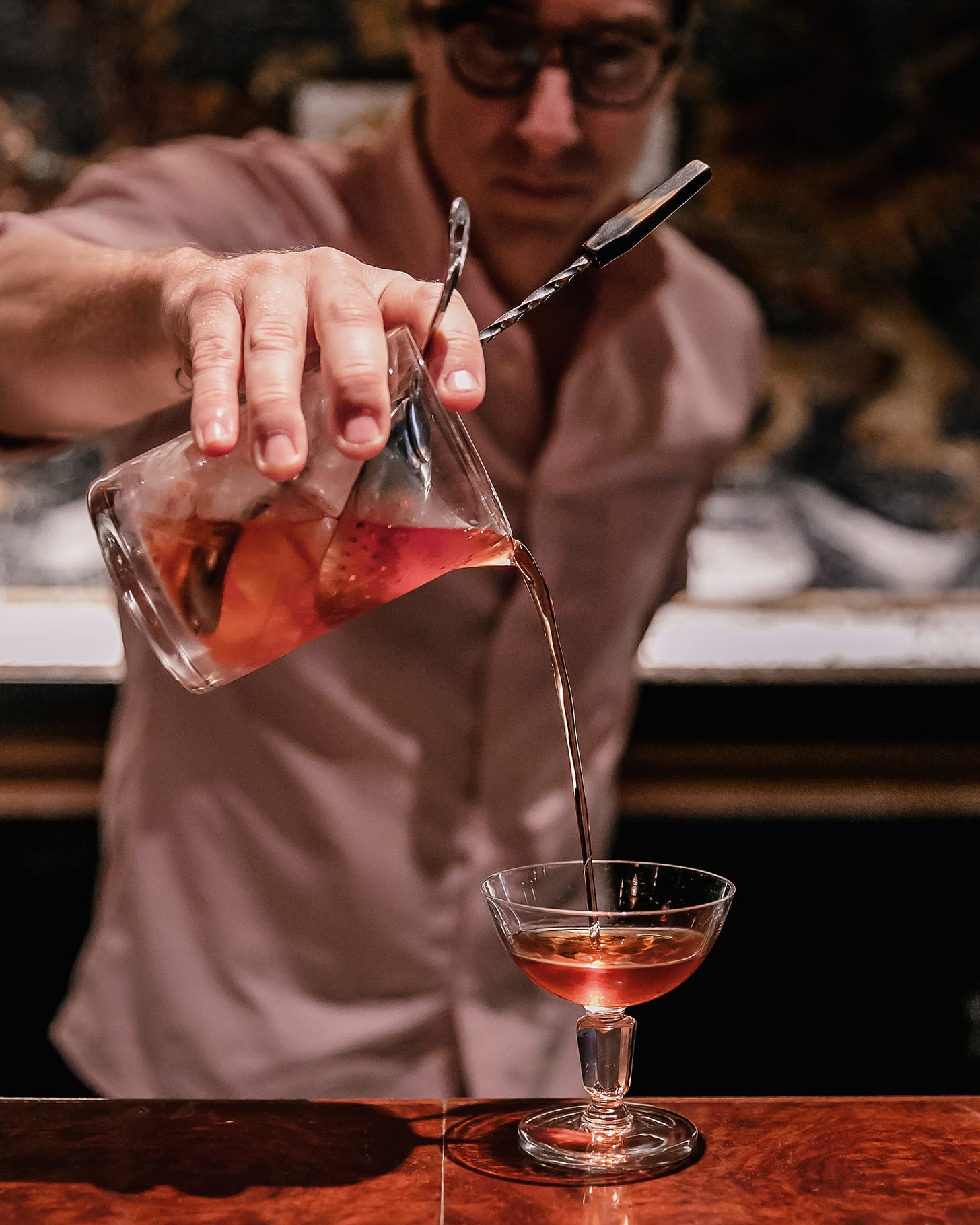"I Wasn't My Best Self"
Some notes on a recent article about my journey to becoming mindful drinker, and why I've been sharing my story since 2020.
If you nose down a recent article about me titled “49-year-old was an award-winning bartender, now he practices ‘mindful drinking’—here’s how it changed his life” by Renée Onque for CNBC, past the pull quotes, past the mentions of my awards and accolades, there’s a short paragraph––a single sentence––that stands in for what was actually the most vulnerable moment of my life.
Right there, the sentence just above the bright green squiggly line:
The article then turns toward the changes I’ve made and the triumph of mindful drinking:
“Mindful drinking is a self-led strategy to drink or not to drink alcohol in accordance with your goals, health or otherwise,” says Brown, founder of Positive Damage Inc. and expert on no- and low-alcohol cocktails and mindful drinking.
The practice involves “trying to align the way that you drink with the way you want to feel.”
The quote about my best self certainly doesn’t convey the gravity of what I actually felt. Another nifty term that I sometimes use in discussing my past to cloak the extent of my shame is the word, “sub-optimal.” But the reality is I felt sub-human. Either way, I had reached a place where I didn’t want to be anymore, and it was time for a change.
In my 2020 Vox article, Becoming a “mindful drinker” changed my life, I share a little more:
I would later be diagnosed with bipolar II disorder. The statistical correlation between bipolar II disorder and alcohol abuse is high, and I lived it. Drinking was a way to make it through the mood swings, impulsivity, risk-taking, and racing thoughts, all of which were sheathed in the appearance of a high-functioning individual. Through drunkenness, I convinced myself that I was well, even happy, that my charms outweighed my faults when my faults were on egregious display. The next morning told a different story.
I go on to recount some of the stories from my drinking days, though I’m careful not to make light of “war stories,” which are the horrible things we do while drunk that we pass off as harmless. However, the key is that we all have these critical moments where we determine who we’re going to be when who we’ve been is hurting us. And, though I sometimes minimize the extent of the damage done (the negative not positive kind), it’s also sometimes important just to say, “I wasn’t being my best self.”
The more important part is what follows, working on yourself. “The work,” they call it. And the title is apt. For me, it involved several stages of therapy, adopting a better diet, doing more healthy activities, and studying mindfulness and positive psychology. And, of course, changing the way I drink. But that was my work. For each person, it may be different.
More than one in five Americans suffer from mental health issues. This is a staggering statistic, but how many actually get the help they need and, subsequently, do the work? Whatever that works means to them. Hopefully, being vocal about my own struggles and seeing how valuable change has been for me will inspire others. Maybe even show them a door to their own future.
It’s not easy, of course. Change doesn’t always happen all at once. Many of those things I adopted were in small spurts or incremental changes. But, when we’ve reached the tipping point, knowing that resources and positive examples of change exist can be crucial.
In the Vox article, I wrote:
It eventually all caught up with me after my son was born, and I started to add up the pluses and minuses of alcohol in my life. I realized the red column had become greater than the black. It would take a little more time and convincing, but I finally checked myself into a recovery program that addressed both my mental health and substance use.
There were some great examples of people within my industry who had changed their lives and the way they drank, including Jack McGarry and Josh Harris. I chose the path of mindful drinking versus sobriety but just seeing how they were able to pivot made a huge impact on me.
And, of course, that was just the starting line. As I described to Qnque:
“It was a door for me to start addressing my sleep, my nutrition [and] movement,” he adds. “Those things really did start to open up this new world for me that I just didn’t see before. And I feel great about that. I don’t feel great every day, but I feel like I have a chance now to feel every day.”
The question remains, if I wasn’t being my best self back then: Am I my best self now? And, though I know that much work remains, I can answer unequivocally, no.
No, I’m not my best self.
But that’s partly because the measure has changed. Being my “best self” means something different to me now, and I’ve also cleared enough space to see that there’s no magic point in the future where I’ll be some hypothetical best self. Instead, there are moments when I’m at my best that build upon each other. And those moments are generally preceded by incremental changes that I make, whether reading a thought-provoking book (right now I’m reading Stephen Hayes’ A Liberated Mind: How to Pivot to What Matters), skateboarding regularly, or spending time with friends and family.
Sometimes it’s as simple as reading an inspiring essay or even writing one myself.
NEW COCKTAIL CLASS: Holidays without the Hangover
If you’re interested in non-alcoholic holiday drinks for yourself or entertaining others, please check out my new course with Atlas Obscura. In three classes, I’ll cover just about everything you need to know to buy, make, and share the very best non-alcoholic beers, wines, and cocktails.
Syllabus below:
Session 1 (Wednesday, 11/15, 7:30–9 PM EST) | An Introduction to Mindful Drinking and Thanksgiving Pairings
Drinks covered: A selection of non-alcoholic wines, beers, and cider pairings
Session 2 (Wednesday, 11/29, 7:30–9 PM EST) | Winter Holiday Drinks
Drinks covered: Satin Ribbon, Glögg, and Gingerbread Old Fashioned
Session 3 (Wednesday, 12/6, 7:30–9 PM EST) | Cheering in the New Year
Drinks covered: Champagne Punch, French 75, and Airmail
Derek Brown is an author, award-winning bartender, NASM-certified wellness coach, and founder of Positive Damage, Inc.
This newsletter is free and public. Share with anyone you think will enjoy it.








"We all have these critical moments where we determine who we’re going to be when who we’ve been is hurting us".
Absolutely true. Where we go from there is up to us, and no one else. Ultimately we are responsible for who we are and who we become. Blaming it on others or circumstances is deflecting.
We also never "arrive". There is no "best self". There is only how we feel in the moment we are in. And since emotions, energy levels, mood swings, etc... change often, this is always in flux. We can only take time to evaluate how we are and perhaps how we got there, and then decide how to move forward. Life is a journey which never ends until our last breath.